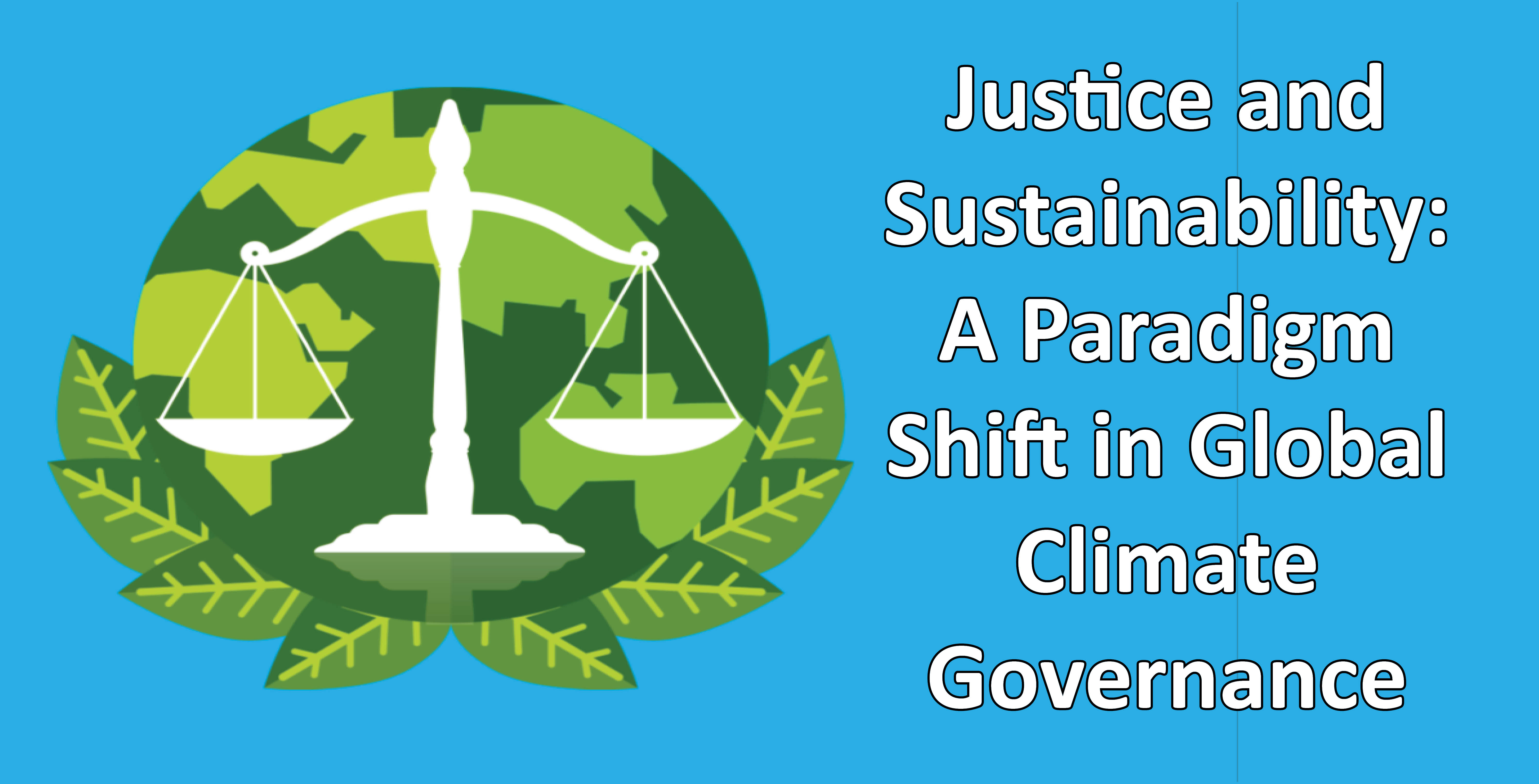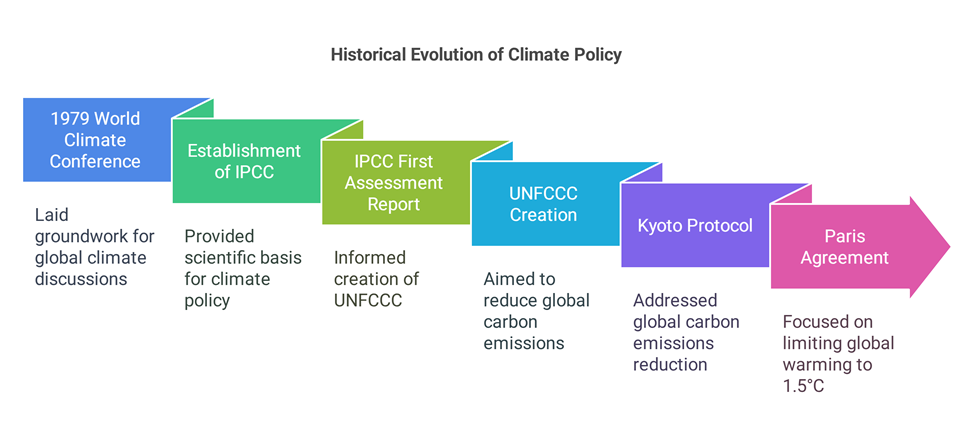Climate change is one of the most pressing challenges of the 21st century, requiring a delicate balance between environmental sustainability and social equity. Historically, the global response to climate change has been marred by disparities between the developed and developing worlds. While industrialized nations have disproportionately contributed to greenhouse gas emissions, developing nations bear the brunt of the consequences. The urgency of addressing these inequities, particularly in the context of accelerating climate impacts, has given rise to calls for a paradigm shift in global climate governance.
The 2024 Climate Conference in Baku exemplified this shift by proposing an alternate global forum that centers justice in sustainability efforts. This approach underscores the importance of empowering developing nations to control their destinies, offering a potential blueprint for addressing the dual challenges of climate change and systemic inequality.
Climate Change: Defining the Crisis
· According to the Intergovernmental Panel on Climate Change (IPCC), climate change refers to a statistically identifiable shift in the climate's properties, persisting for decades or longer. These shifts may stem from natural factors, such as volcanic eruptions and solar cycles, or anthropogenic activities, including greenhouse gas emissions and land-use changes. The United Nations Framework Convention on Climate Change (UNFCCC) emphasizes the role of human activity in altering atmospheric composition, distinguishing such changes from natural climate variability.
· The ramifications of climate change are profound. Rising global temperatures approach tipping points that could irreversibly damage ecosystems, disrupt human societies, and exacerbate existing inequalities. These challenges necessitate a reevaluation of global climate policies, which have historically favored mitigation strategies while underestimating the need for adaptation.
Historical Evolution of Climate Policy
· Efforts to address climate change began gaining momentum in the late 20th century. The 1979 World Climate Conference, convened by the World Meteorological Organization (WMO), was a watershed moment, laying the groundwork for subsequent global discussions. The establishment of the IPCC in 1988 marked another significant milestone, providing a scientific basis for policy decisions.
· The IPCC’s First Assessment Report (1990) informed the creation of the UNFCCC at the 1992 Earth Summit, which aimed to reduce global carbon emissions. Subsequent IPCC reports shaped key agreements, including the Kyoto Protocol and the Paris Agreement. The Sixth Assessment Report (2021) highlighted the urgency of limiting warming to 1.5°C, calling for a dual focus on mitigation and adaptation.
· Despite these efforts, global climate governance has often perpetuated systemic inequalities. Industrialized nations, primarily responsible for historical emissions, have used selective agenda-setting to maintain their advantages. For example, the G7’s commitments to climate finance often fail to deliver substantive outcomes, leaving vulnerable nations to address climate impacts with limited resources.
Climate Justice: A Critical Imperative
At its core, climate justice seeks to address inequities between and within nations, emphasizing the disproportionate burden borne by developing countries. The Global South, home to four-fifths of the world’s population, faces significant climate risks despite contributing minimally to cumulative emissions. This injustice is compounded by global policies that often exacerbate income disparities and prioritize the interests of industrialized nations.
· Nationally Determined Contributions (NDCs) have emerged as a key mechanism for incorporating justice into climate action. Seventy-two countries now include the principle of a “just transition” in their NDCs, highlighting the importance of fairness in energy transitions and adaptation efforts. However, achieving true climate justice requires addressing systemic inequalities embedded in international governance structures.
Impacts of Climate Change on Vulnerable Communities
Climate change manifests through long-term shifts in weather patterns and extreme events, both of which have devastating impacts on communities and ecosystems.
Long-Term Changes
Gradual changes, such as rising sea levels, shifting precipitation patterns, and ocean acidification, disrupt ecosystems and economic systems over time. For instance, rising temperatures have caused glacial melting, threatening freshwater supplies and increasing the risk of flooding in downstream regions.
Extreme Weather Events
Cyclones, floods, heatwaves, and droughts cause immediate devastation. The Indian Meteorological Department (IMD) reported alarming trends in 2022, including:
· Temperatures 3–8°C above normal in parts of India.
· Increased frequency of cyclones and heavy rainfall events.
· Widespread flooding and landslides, exacerbating socioeconomic vulnerabilities.
These impacts disproportionately affect developing countries like India, where approximately one-third of GDP is derived from natural resource-dependent sectors. By 2100, climate risks could reduce India’s income by 6.4%–10%, potentially pushing an additional 50 million people into poverty.
Adaptation: A Path to Resilience
As climate impacts intensify, adaptation has become a critical component of global response strategies. While mitigation focuses on reducing emissions, adaptation aims to build resilience to the inevitable consequences of climate change.
Community-Level Adaptation
A study of Indian coastal, plain, and hill regions highlights diverse adaptation strategies:
· Coastal Areas: Fishermen adjust their practices to cope with rising sea levels and changing fish migration patterns.
· Plains: Farmers adopt short-duration crops to mitigate losses from altered rainfall patterns.
· Hills: Planters combat pest outbreaks driven by temperature and precipitation changes.
Despite these efforts, many individuals and communities lack the resources to adapt effectively. As a result, migration due to weather-related disasters is on the rise, with 14% of Indians already displaced.
Adaptive Governance
Effective adaptation requires financial resources, advanced research, community engagement, and robust institutional frameworks. The concept of “adaptive governance” emphasizes localized decision-making, grassroots policy ideas, and inclusive implementation processes. For countries like India, integrating adaptive governance into national climate strategies is essential for safeguarding vulnerable populations.
Redefining Global Climate Governance
The 2024 Baku Climate Conference highlighted the need for an alternate sustainability framework that centers justice and equity. Key proposals include:
· Establishing a Global South-Led Forum: Developing nations should create a collaborative platform to support urban energy transitions, monitor G7 climate policies, and share best practices.
· Reforming UN Climate Negotiations: The UN should focus on holding industrialized nations accountable for emissions reductions while providing substantial grants to vulnerable regions.
· Rethinking Multilateral Institutions: Annual stocktaking in global institutions should prioritize evaluating progress and enabling course corrections. For instance, ineffective mechanisms like the World Trade Organization’s dispute resolution system could be replaced with more inclusive frameworks.
The Way Forward
Addressing climate change requires a holistic approach that balances mitigation, adaptation, and justice. The Global South, led by nations like India, has an opportunity to redefine global governance by emphasizing shared prosperity within ecological limits. By fostering collaboration, allocating resources equitably, and prioritizing vulnerable populations, the international community can build a sustainable and just future.
Justice is not merely a moral imperative; it is a practical necessity for addressing the systemic inequalities that underpin the climate crisis. As the impacts of climate change intensify, the call for justice must guide global efforts, ensuring that no nation is left behind in the pursuit of sustainability.
|
Main question: Discuss the concept of ‘adaptive governance’ and its significance in addressing climate change in developing countries. Illustrate with examples from India. Examine the challenges and opportunities in achieving a ‘just transition’ as part of India’s Nationally Determined Contributions (NDCs). How can equity and sustainability be balanced in energy transitions? |








